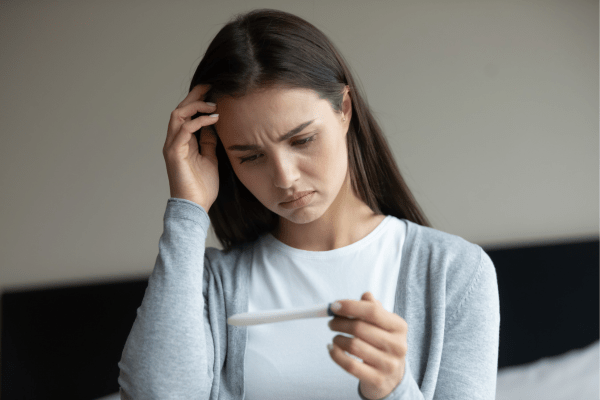Outline of the Article
- Introduction to Poor Ovarian Reserve and Infertility
– Understanding ovarian reserve
– Factors contributing to poor ovarian reserve
– Link between poor ovarian reserve and infertility
- Signs and Symptoms of Poor Ovarian Reserve
– Irregular menstrual cycles
– Difficulty conceiving
– Hormonal imbalances
- Causes of Poor Ovarian Reserve
– Age-related decline
– Genetic factors
– Environmental influences
- Diagnosing Poor Ovarian Reserve
– Hormonal tests
– Antral follicle count
– Ovarian reserve testing methods
- Impact of Poor Ovarian Reserve on Fertility Treatments
– IVF (In Vitro Fertilization) success rates
– Challenges in fertility treatments for women with poor ovarian reserve
- Treatment Options for Poor Ovarian Reserve
– Lifestyle changes and supplements
– Ovarian stimulation protocols
– Alternative therapies
- Emotional and Psychological Impact
– Coping with the diagnosis
– Support systems and resources
- Future Possibilities and Research Advancements
– Emerging technologies and therapies
– Promising areas of research
- Conclusion
Poor Ovarian Reserve and Infertility
Infertility is a sensitive and challenging issue faced by many couples worldwide. Among the various causes contributing to infertility in women, one significant factor is poor ovarian reserve. Understanding the implications of this condition is crucial for those navigating fertility challenges.
Signs and Symptoms of Poor Ovarian Reserve
Recognizing the signs of poor ovarian reserve can help individuals seek timely medical advice. Irregular menstrual cycles, difficulty conceiving despite frequent attempts, and hormonal imbalances are common indicators. These symptoms can be distressing but seeking professional guidance is essential.
Causes of Poor Ovarian Reserve
Factors contributing to diminished ovarian reserve include age-related decline, genetic predisposition, and environmental influences. While age remains a prominent factor, other elements like exposure to toxins or certain medical treatments may also impact ovarian health.
Diagnosing Poor Ovarian Reserve
Accurate diagnosis involves hormonal tests, antral follicle counts via ultrasounds, and specific ovarian reserve testing methods. These evaluations provide insights into a woman’s ovarian function, aiding in formulating appropriate fertility treatment plans.
Impact on Fertility Treatments
For women undergoing fertility treatments like IVF, poor ovarian reserve poses challenges. Lower success rates and a reduced number of viable eggs may affect treatment outcomes. However, individualized protocols and advanced techniques in assisted reproductive technology offer hope.
Treatment Options
Addressing poor ovarian reserve involves a multifaceted approach. Lifestyle modifications, dietary supplements, and specific ovarian stimulation protocols tailored to individual needs can enhance ovarian function. Alternative therapies, when combined with conventional treatments, might offer additional support.
Emotional and Psychological Impact
The diagnosis of poor ovarian reserve can be emotionally taxing. Coping strategies, emotional support, and access to counseling play a crucial role in managing the associated stress and anxiety.
Future Possibilities and Research
Ongoing research explores innovative technologies and promising therapies aimed at improving ovarian health and fertility outcomes. Advancements in this field offer hope for individuals grappling with poor ovarian reserve.
Conclusion
Poor ovarian reserve presents significant challenges to fertility, but a comprehensive approach combining medical interventions, emotional support, and advancements in research can provide avenues for hope and possibilities.
Certainly! Here are five FAQs related to Poor Ovarian Reserve and Infertility along with their respective answers:
FAQs
- What are the primary causes of poor ovarian reserve?
– Answer: Poor ovarian reserve can result from various factors, including advanced maternal age, genetic predisposition, exposure to toxins, previous surgeries on ovaries, autoimmune conditions, and certain medical treatments like chemotherapy or radiation therapy.
- How is poor ovarian reserve diagnosed?
– Answer: Diagnosis typically involves hormonal tests (such as FSH, AMH, and estradiol levels), antral follicle counts using ultrasound, and ovarian reserve testing methods like the clomiphene citrate challenge test (CCCT) or the gonadotropin-releasing hormone (GnRH) agonist stimulation test.
- What are the available treatment options for women with poor ovarian reserve?
– Answer: Treatment approaches may include lifestyle modifications (healthy diet, regular exercise), supplements (like Coenzyme Q10 or DHEA), ovarian stimulation protocols (customized hormone therapies), and sometimes alternative therapies such as acupuncture or herbal remedies.
- How does poor ovarian reserve affect fertility treatments like IVF?
– Answer: Poor ovarian reserve can impact the success rates of In Vitro Fertilization (IVF) by reducing the number of viable eggs retrieved, potentially leading to fewer embryos for transfer. However, personalized protocols and specialized techniques in assisted reproductive technology can optimize outcomes.
- Are there lifestyle changes that can improve ovarian health?
– Answer: Yes, adopting a healthy lifestyle can positively influence ovarian health. Maintaining a balanced diet rich in antioxidants, managing stress levels, avoiding smoking and excessive alcohol consumption, and regular exercise can potentially support ovarian function and overall reproductive health.
For individuals facing challenges related to IVF failures or fertility issues, seeking expert guidance is crucial for a personalized and effective approach. MotherToBe, under the leadership of renowned fertility specialist Dr. S. Vyjayanthi, offers comprehensive solutions and advanced reproductive care in India.
Dr. S. Vyjayanthi’s Credentials:
– Medical Degrees: MD, DGO, DNB, MRCOG
– Specialization in Reproductive Medicine & Surgery: Subspecialist (RCOG, UK)
– Master’s Degree in Embryology: MSC (Embryology, UK)
– Certification: CCT (Clinical Competence, UK)
Professional Roles:
– Director and Fertility Specialist, MotherToBe:
– Dr. Vyjayanthi leads the team at MotherToBe, overseeing the delivery of high-quality fertility services.
– Head of Department & Consultant Fertility Specialist, KIMS, Secunderabad:
– In her role at KIMS, she serves as the Head of the Department and a Consultant Fertility Specialist, contributing to the advancement of fertility care.

